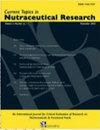进行性营养支持护理在尿毒症血液透析患者中的临床价值
IF 0.4
4区 医学
Q4 NUTRITION & DIETETICS
Current Topics in Nutraceutical Research
Pub Date : 2023-08-12
DOI:10.37290/ctnr2641-452x.21:468-472
引用次数: 0
摘要
尿毒症不仅涉及血浆中尿毒症溶质小分子的积累,还涉及肠道微生物群的生态失调。目前,血液透析是临床治疗尿毒症患者的首选方法,可避免肠道菌群紊乱引起的肠道疾病等并发症。在此,我们试图阐明益生菌在尿毒症血液透析患者进行性营养支持护理中的临床价值。将我院2021年10月至2022年10月进行血液透析的尿毒症患者136例分为实验组和对照组。对照组采用常规护理,实验组采用渐进式营养支持护理(干预组)。干预后,实验组的EuroQoL-5维度问卷视觉模拟量表得分明显高于对照组(P <0.05)。与健康相关的生活质量问题,包括肌酐清除率、尿素氮清除率、体重指数和白蛋白,实验组高于对照组,而白细胞计数则低于对照组(P <0.05)。此外,实验组总并发症发生率低于对照组(P <0.05)。综上所述,对尿毒症患者实施渐进式营养支持护理可以改善临床指标,减少并发症的发生。本文章由计算机程序翻译,如有差异,请以英文原文为准。
Clinical Value of Progressive Nutritional Support Nursing in Uremic Patients Undergoing Hemodialysis
Uremia not only involves the accumulation of small molecules of uremic solutes in plasma but also ecological dysregulation of the gut microbiota. At present, hemodialysis is the preferred method for clinical management of uremic patients to avoid complications such as intestinal diseases caused by intestinal flora disturbances. Herein, we have attempted to clarify the clinical value of probiotics in progressive nutritional support nursing for uremic hemodialysis patients. One hundred and thirty-six uremic patients undergoing hemodialysis in our hospital between October 2021 and October 2022 were divided into experimental and control groups. The control group underwent conventional nursing care, whereas the experimental group underwent progressive nutritional support nursing (intervention group). After intervention, the visual analogue scale scores of the EuroQoL-5 Dimension Questionnaire in the experimental group were elevated relative to those in the controls (P < 0.05). The health-related quality of life questions that included creatinine clearance rate, urea nitrogen clearance rate, body mass index, and albumin were higher in the experimental group than controls, whereas the white blood cell count in the experimental group was lower than controls (P < 0.05). Furthermore, the total complication rate in the experimental group was lower than the control group (P < 0.05). In summary, applying progressive nutritional support nursing to uremic patients can improve clinical indicators and reduce the incidence of complications.
求助全文
通过发布文献求助,成功后即可免费获取论文全文。
去求助
来源期刊
CiteScore
1.10
自引率
0.00%
发文量
36
审稿时长
>12 weeks
期刊介绍:
Current Topics in Nutraceutical Research is an international, interdisciplinary broad-based peer reviewed scientific journal for critical evaluation of research on chemistry, biology and therapeutic applications of nutraceuticals and functional foods. The major goal of this journal is to provide peer reviewed unbiased scientific data to the decision makers in the nutraceutical and food industry to help make informed choices about development of new products.
To this end, the journal will publish two types of review articles. First, a review of preclinical research data coming largely from animal, cell culture and other experimental models. Such data will provide basis for future product development and/or human research initiatives. Second, a critical evaluation of current human experimental data to help market and deliver the product for medically proven use. This journal will also serve as a forum for nutritionists, internists, neurologists, psychiatrists, and all those interested in preventive medicine.
The common denominator of all of the topic to be covered by the journal must include nutraceuticals and/functional food. The following is an example of some specific areas that may be of interest to the journal. i) Role of vitamins, minerals, antioxidants and phytonutrients on cardiovascular health, cancer, diabetes, ocular health, mental health, men’s health, women’s health, infant nutrition, ii) Role of herbals on human health, iii) Dietary supplements and sleep, iv) Components of diet that may have beneficial effect on human health, v) regulation of apoptosis and cell viability, vi) Isolation and characterization of bioactive components from functional foods, vii) Nutritional genomics, and viii) Nutritional proteomics.

 求助内容:
求助内容: 应助结果提醒方式:
应助结果提醒方式:


